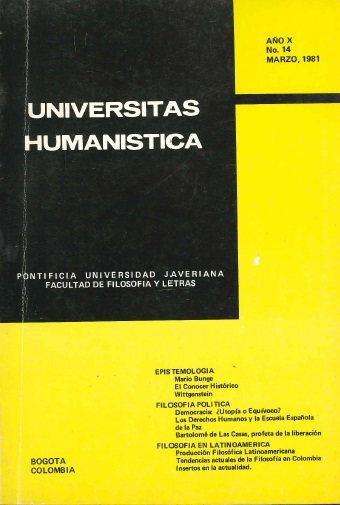Abstract
El presente trabajo trata de ubicar el pensamiento de Wittgenstein en lo que creemos que fue su intento fundamental: hacer filosofía a partir de una adecuada comprensión del lenguaje humano en cuanto modo básico de organización de nuestra experiencia de la realidad. El hilo conductor nos lo ofrece el estudio de las dos metáforas que desarrolló Wittgenstein para entender el lenguaje humano: la metáfora de la "figura" (Bild) y la metáfora de los "juegos lingüísticos" (Spie/Sprachen) que corresponden, respectivamente, al primero y segundo período de su pensamiento. La segunda metáfora se analiza en contraste con la primera, según indica el propio autor ¿Son ambas metáforas excluyentes o complementarias? Es un planteamiento que también se aborda en estas páginas. El análisis de las metáforas sobre el lenguaje nos conduce, casi espontáneamente, a una exposición, -bastante somera para no repetir ideas ya apuntadas—, del concepto wittgensteniano de filosofía que permanece en todo momento pensado como "crítica del lenguaje" la cual exige métodos de trabajo adecuadamente diferenciados para los diversos "juegos lingüísticos".

This journal provides immediate open access to its content on the principle that making research freely available to the public, encourages greater global exchange of knowledge.
The journal Universitas Humanística is registered under a Creative Commons Attribution 4.0 International Public License. Thus, this work may be reproduced, distributed, and publicly shared in digital format, as long as the names of the authors and Pontificia Universidad Javeriana are acknowledged. Others are allowed to quote, adapt, transform, auto-archive, republish, and create based on this material, for any purpose (even commercial ones), provided the authorship is duly acknowledged, a link to the original work is provided, and it is specified if changes have been made. Pontificia Universidad Javeriana does not hold the rights of published works and the authors are solely responsible for the contents of their works; they keep the moral, intellectual, privacy, and publicity rights.
Approving the intervention of the work (review, copy-editing, translation, layout) and the following outreach, are granted through an use license and not through an assignment of rights. This means the journal and Pontificia Universidad Javeriana cannot be held responsible for any ethical malpractice by the authors. As a consequence of the protection granted by the use license, the journal is not required to publish recantations or modify information already published, unless the errata stems from the editorial management process. Publishing contents in this journal does not generate royalties for contributors.


